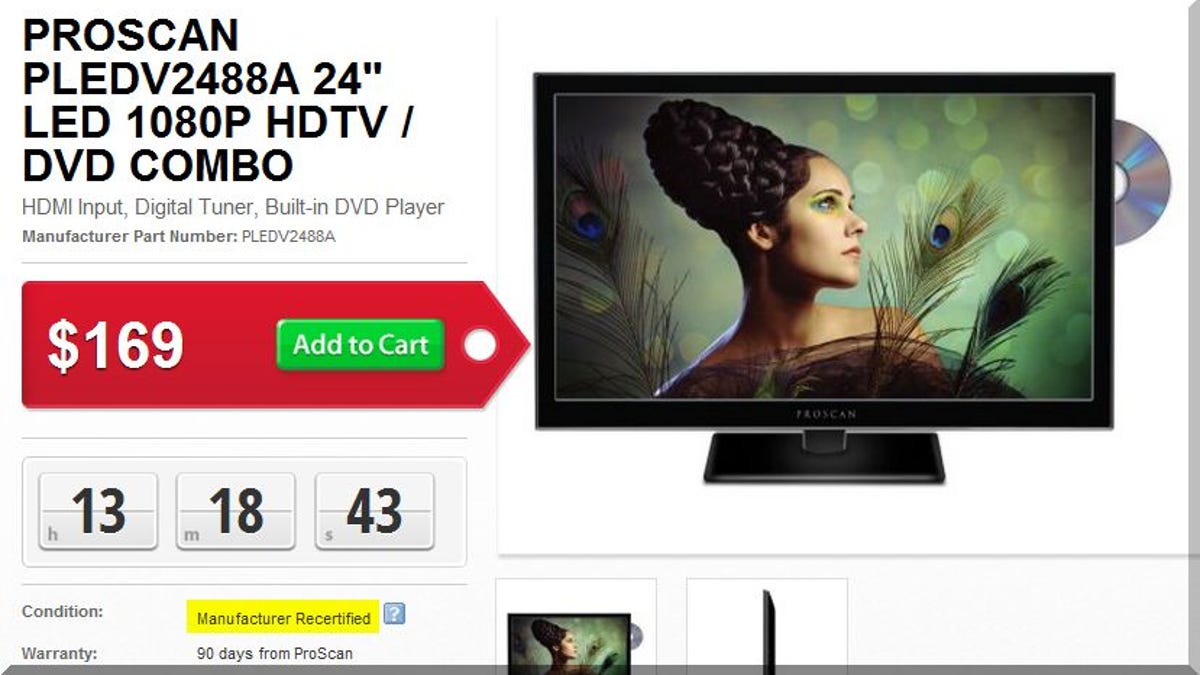Three tech items you should never buy refurbished
Make no mistake: some refurbished deals are just plain awesome. But others...not so much.
Here's a deal of the day that normally would make me sit up and take notice:
RedTag has the Proscan PLEDV2488A 24-inch LED HDTV with built-in DVD player for $169, plus $1.95 for shipping.
Just one problem: it's refurbished.
Surprised? Normally I'm a champion of refurbished gear. You'll often hear me touting deals on refurbished laptops, tablets, Blu-ray players, and the like. In fact, I think if you're shopping for any Apple product, you should go the refurb route every time.
But there are exceptions, starting with the aforementioned deal. Here's a rundown of the three kinds of tech gear I won't buy refurbished:
1. Hard drives
The argument for buying anything refurbished goes like this: if it was returned because it had a problem, that problem has already been fixed -- meaning you're potentially better off with a refurbished unit than you are with a new one.
I don't think that applies to hard drives. Whether it was returned owing to a defect or simply because a person didn't like it, the fact is that it's been used. There is no "refurbishment" process I'm aware of that can restore a hard drive to factory-new condition. And with drive prices so low already, is it really worth gambling your data on a unit that's already seen some action?
2. Printers
This is more of a guideline than a rule, as a refurbished printer might prove to be a decent deal.
My chief concern is that if ink or toner has already cycled through the printer's innards, then what you're really getting is a used printer, not one that's been restored to factory-new condition. And as we all know, ink and toner have a way of gumming up the works, especially if the printer sits idle for a long period.
That said, if you can confirm from the seller's description that the printer has indeed been recertified by the manufacturer, and that it comes with brand-new ink/toner, it might be worth buying -- especially if the savings are significant.
3. Televisions
Buying a refurbished TV can save you a decent chunk of change, sometimes amounting to hundreds of dollars. But I flatly refuse to buy one, in part because I already did.
In fact, I've purchased two refurbished TVs in my life, and both arrived in a condition best described as "horrendous." One had a broken stand, the other looked like it had been packaged by monkeys. And I've heard from others about scuffed, damaged, and/or poorly shipped TVs.
For whatever reason, refurbished TVs don't seem to get the same loving treatment afforded laptops, tablets, and the like. Maybe it's because they're so large and heavy, and because their packaging is so fragile to begin with. Whatever the case, I'm steering clear, now and forever.
There's also the matter of warranty. A typical refurb is covered for 90 days, and TVs these days are too unreliable for that short a protection plan.
Oh, and for the record, Walmart.com has that same Proscan TV new for just $10 more (well, not including sales tax). Moral of the story: just because something is refurbished, don't assume the savings are significant. Sometimes the difference is only 10 bucks.
Have you purchased refurbished gear before? If so, what was your experience? I've scored a lot of outstanding deals on refurbs, and I'll continue to seek them out -- as long as they're not printers, TVs, or hard drives.


